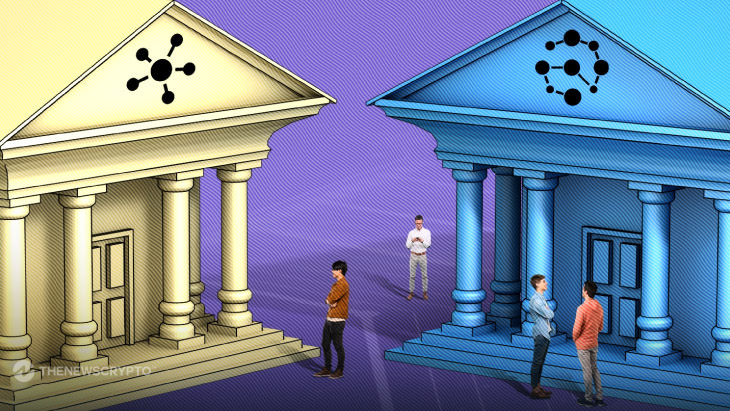What Is a Centralized Crypto Exchange?
A crypto exchange functions as a marketplace where individuals can engage in buying and selling digital assets, such as cryptocurrencies. A centralized cryptocurrency exchange functions as a digital currency trading platform, where a central entity serves as an intermediary between buyers and sellers of cryptocurrencies. Regular users predominantly favor centralized exchanges, making them the most popular type of cryptocurrency exchanges.
The term “centralized cryptocurrency exchange” encompasses the concept of relying on a middle man or third party to facilitate transactions, instilling trust in the intermediary to handle assets. This arrangement resembles the trust relationship between customers and banks, where customers trust the bank to safeguard their funds.
The purpose of this arrangement is rooted in the fact that banks provide security measures and oversight that individuals cannot replicate independently. Similarly, in the realm of centralized cryptocurrency exchanges, the same principle applies. Users trust the exchange not only to ensure the secure completion of their transactions but also to leverage its user network in order to find suitable trading partners.
Features of a Centralized Crypto Exchange
One distinctive characteristic of centralized exchanges is their possession of clients’ wallet private keys, which play a vital role in facilitating cryptocurrency transfers. Furthermore, centralized exchanges generally require users to complete a Know Your Customer (KYC) process, driven by the need to adhere to regulatory mandates.
The purpose of KYC procedures is to validate user identities, serving as a deterrent against illicit practices like money laundering and the funding of terrorist activities. Users are required to provide identity information, submit verification documents, and wait for the verification of their KYC documents. Upon completion of these steps, users are typically authorized to fund their accounts and initiate trading activities.
What Are the Advantages of Centralized Crypto Exchanges?
User-Friendly
For beginner investors, centralized exchanges offer a comfortable and familiar avenue for trading and investing in cryptocurrencies. Unlike the complexities involved in using crypto wallets and engaging in peer-to-peer transactions, users of centralized exchanges can simply log into their accounts, monitor their balances, and execute transactions through intuitive applications and websites.
Reliable
When it comes to transactions and trading, centralized exchanges offer an additional layer of security and reliability. By utilizing their advanced, centralized platforms, these exchanges instill a higher level of comfort for users.
Leverage
Certain centralized exchanges offer the advantage of margin trading, which enables investors to leverage their investments by borrowing funds from the exchange. This option allows for the potential of higher returns, although it should be noted that losses can be magnified as well.
Examples of Popular Centralized Cryptocurrency Exchanges
Binance, Coinbase, and Kraken stand as prominent examples of centralized exchanges (CEXs) that have gained significant popularity in the world of cryptocurrencies. These exchanges facilitate a wide range of services, including spot trading, futures trading, and various financial solutions tailored to the needs of digital asset users.
What are the Disadvantages of Centralized Cryptocurrency Exchanges?
Hacking Risk
Companies operating centralized exchanges bear the responsibility of safeguarding their customers’ holdings. Given that large exchanges often hold billions of dollars worth of bitcoin, they become prime targets for hackers and potential theft.
Custody of Digital Assets and Risk of Fraud
CEXs commonly function as custodians, retaining digital assets in their own digital wallets rather than enabling users to manage their private keys in personal wallets. While this arrangement enhances trading convenience, it also brings forth concerns such as the risk of the centralized exchange failing and the potential for fraud.
Transaction Fees
In contrast to peer-to-peer transactions, centralized exchanges commonly impose significant transaction fees for their services and convenience, particularly when engaging in large-volume trading.
What is Decentralized Cryptocurrency Exchanges
A decentralized cryptocurrency exchange is constructed on a decentralized, noncustodial blockchain system, with its primary focus being the facilitation of direct peer-to-peer transactions. Prominent examples of decentralized exchanges (DEXs) include Uniswap, PancakeSwap, dYdX, and Kyber. Lowering transaction fees, enabling users to hold their assets directly, and mitigating regulatory burdens are among the core aims of DEXs.
Decentralized exchanges operate using smart contracts, which are self-executing code pieces on a blockchain, providing enhanced privacy and lower transaction costs compared to centralized cryptocurrency exchanges. Decentralized exchanges stand out for their resilience to censorship, as they eliminate the need for KYC requirements, making them highly appealing to users seeking to trade anonymously.
Moreover, decentralized exchanges have the advantage of catering to unbanked users who are unable to utilize traditional banking services due to the lack of KYC requirements, particularly individuals without the necessary documentation.
Advantages of Decentralized Cryptocurrency Exchanges
Token Availability
Unlike centralized exchanges that have to perform individual token vetting and regulatory compliance checks before listing, decentralized exchanges have the flexibility to include any token minted on their underlying blockchain. This means that new projects are likely to be listed on decentralized exchanges before becoming available on centralized platforms.
Reducing Security Risks
By utilizing DEXs, experienced cryptocurrency users who custody their funds can minimize the risk of being hacked, as these exchanges do not hold their assets. Instead, traders maintain control over their funds and only engage with the exchange when necessary. In the event of a hack, it is primarily the liquidity providers who may encounter potential risks.
Less Censorship
The absence of know-your-customer (KYC) requirements in DEXs enables users to maintain privacy and anonymity. DEXs, unlike centralized exchanges (CEXs), do not engage in censorship, resulting in a broader selection of cryptocurrencies and digital assets being available. In fact, numerous Altcoins can only be traded on DEXs.
Disadvantages of Decentralized Exchanges
Necessary to Have Certain Knowledge
To access DEXs, users utilize cryptocurrency wallets capable of interacting with smart contracts. In addition to acquiring proficiency in operating these wallets, users must comprehend security-related principles to ensure the protection of their funds.
Liquidity Struggles
The overwhelming majority of crypto transactions, around 99%, are conducted through centralized exchanges, making them responsible for the bulk of trading volume. In contrast, decentralized exchanges frequently encounter liquidity issues, making it challenging to locate buyers and sellers, especially during periods of low trading activity.
Lists for Unvetted Tokens
Decentralized exchanges allow anyone to list a new token and provide liquidity by creating pairs with other coins. However, this openness can expose investors to scams like rug pulls, where deceptive practices mislead them into believing they are purchasing a different token. To mitigate these risks, certain DEXs implement a measure where users are required to verify the smart contract of the tokens they wish to buy. However, this solution presents a challenge for less experienced users, as it requires specific knowledge and understanding.
Examples of Popular Decentralized Exchanges
Uniswap
Uniswap is a decentralized exchange (DEX) built on the Ethereum blockchain that operates using an automated liquidity protocol. It has gained recognition for its user-friendly interface, enabling individuals with an Ethereum wallet to directly trade tokens from their wallet.
PancakeSwap
PancakeSwap has emerged as a dominant decentralized exchange (DEX) on the BNB Chain network, distinguished by its implementation of an innovative Automated Market Maker (AMM) model. This model empowers users to trade digital assets directly from their wallets, streamlining the overall trading process.
SushiSwap
SushiSwap, an Ethereum-based decentralized exchange (DEX), has garnered attention for its unique characteristics. Functioning as a community-driven platform, it builds upon Uniswap’s foundational protocol and offers users additional capabilities like yield farming and staking, fostering active participation and value generation.
Conclusion
As cryptocurrencies continue to gain widespread acceptance and the cryptocurrency landscape evolves, the future of cryptocurrency exchanges appears exceedingly promising, characterized by substantial advancements and transformative growth. Governments and regulatory bodies across the globe are progressively taking actions to establish comprehensive regulations for cryptocurrencies and exchanges.
In an effort to enforce regulations, the US Securities and Exchange Commission (SEC) has initiated actions against major cryptocurrency exchanges, including Binance and Coinbase. The SEC filed a lawsuit last month, accusing both exchanges of unlawfully operating as securities exchanges without proper registration. These regulatory efforts are expected to have a significant impact on the operations of crypto exchanges, fostering investor confidence, enabling closer integration with traditional financial institutions, and cultivating a market environment that prioritizes platform security and transparency.
Highlighted Crypto News Today






